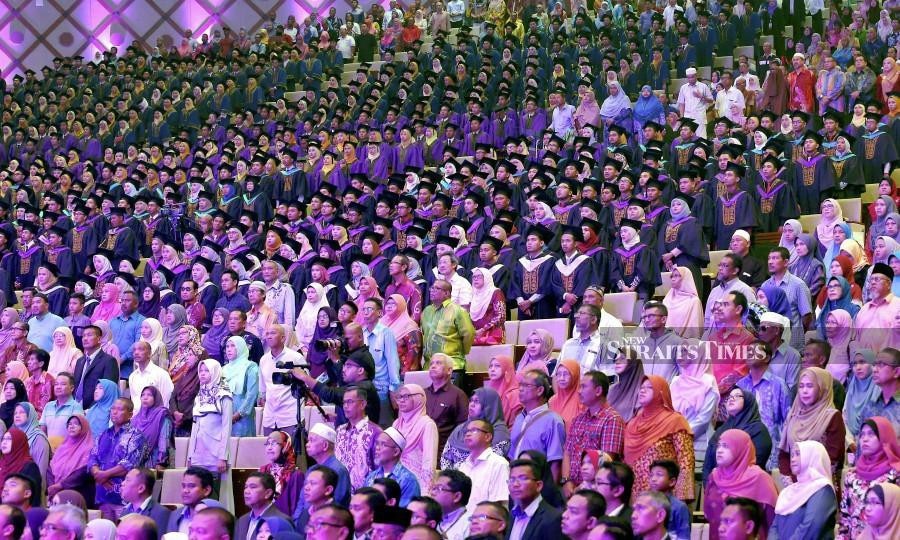Which way for lasting change?
Emeritus Professor Tan Sri Dato' Dzulkifli Abdul Razak
Opinion - The New Strait Time
March 30, 2019

Being too individual-focused is missing the point and causing more delays if the larger ecosystem is not given its due importance. - NSTP/File pic
I WAS at a convocation of one of Malaysia’s largest universities (MLU) recently. It was a grand event as it welcomed a new chancellor and a vice-chancellor who was taking over from a very experienced academic-cum-bureaucrat. In all it was a memorable experience worthy of many reflections in bringing out a lasting change. I spent the remaining hours of the ceremony thinking about it.
It is even more so because the outgoing vice-chancellor is someone well recognised in the higher education sector. He used to serve as the director-general (DG) of Higher Education for many years. Then he went on to serve as a vice-chancellor of a private university. He made his mark by turning the university into a well acknowledged entity in the higher education sector.
No doubt, his experience played an advantageous role although he was just a deputy vice-chancellor at a public university in the north before being handpicked as D-G. I stress this because there were many in such positions in this country (although one was a D-G thus far then) when they were chosen to helm various private universities that ranked among the top in the country. It looked as though being a D-G may be a plus but not sufficient to pull up a private higher education institution (HEI). Why is this distinction important?
To start off with, it helps to throw some light on what makes a HEI tick. Is it the vice-chancellor or the ecosystem that holistically nurtures the institution? Often the former is singled out. An elaborate (convoluted?) scheme was deceived to “select” the “right” person regardless of the ecosystem involved, sans political interference (somewhat). I always thought it is the reverse. The MLU “case” seems to back my hunch. How so?
One single piece of evidence is when the outgoing MLU vice-chancellor was deliberately transferred out from a private HEI to head a public one. This is not only bold and business unusual but it is bureaucratically prohibited. On paper, those who had left the public service for the private cannot “return” unless the powers-that-be decide otherwise — as it is in this case.
The argument for the rare move is: if the private HEI can be “transformed” by a person, it follows the same could be done by the same individual when helming a public HEI. After all, both are HEIs, goes the reasoning. In fact, the move is indeed replicated at Malaysia’s premier university (MPU) where the incumbent is also from a private entity. In both cases, the differences or similarities between the two HEIs do not seem to bother the decision- or policy-makers.
Using this as a basis for assumption, let us attempt to rationalise the question: is it the individual or the ecosystem that matters most in bringing about a “transformational” change in HEIs? I choose the latter, as mentioned earlier due to at least three factors.
FIRSTLY, the fact that the outgoing vice-chancellor served only one term seems to indicate that the option to move one from private to public HEI is not as “productive”.
There may be some changes taking place but not “transformational” in nature (as it may require a longer period). Thus another term could be justified but this is not happening.
SECONDLY, he has since allegedly moved back to head another private HEI, meaning to say his higher education leadership skills are still sought-after.
THIRDLY, the person succeeding him is not from the private sector, but from another public HEI where he has acted as a deputy vice-chancellor previously.
Cursorily, it is tempting to conclude that more than an individual, the ecosystem of HEIs has an over-riding effect before any significant change can be rooted institutionally. This encompasses issues that liberate the academic environment rendering it more flexible and autonomous which the private HEIs tend to enjoy more, relatively speaking Whereas the public counterparts are more constrained, if not (over) regulated, based on the axiom: he (read the government) who pays the piper calls the tune. In short, it is very much a question of political will and intellectual courage that are desperately needed to recreate an energising academic ecosystem in laying down a lasting foundation for transformational change.
As the jury is still out, it is interesting to see if MPU will go through similar experiences as in the case of MLU; or otherwise. It will go a long way to settle the hypothesis that the ecosystem must be first put right at all costs (read: autonomy, freedom and independent) in the true meaning with deeper understanding of the words, academically speaking. Being too individual-focused is missing the point and causing more delays if the larger ecosystem is not given its due importance.
The writer, an NST columnist for more than 20 years, is International Islamic University Malaysia rector
